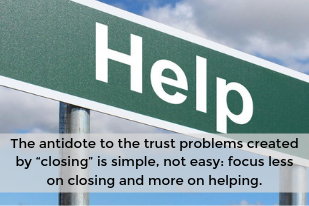This post is part of our Weekly Tips series.

The phrase Always Be Closing has positive connotations in some circles. It was taught for many years in the well-regarded Xerox sales system as a reminder to constantly explore customer needs. More often than not, though, “closing” draws down on trust—whether you’re selling a product, service, or idea. Here are three reasons not to do it.
- Closing closes down the conversation. Closing is typically used as a technique to get someone to take action. (You might even call it “action planning” from time to time.) In a true sales context, consider the assumptive close, “How much would you like to donate to XYZ charity today?” and the either/or close, “Would you like that in red or green?” These questions don’t continue dialogue; they stop it.
- Closing is usually attempted prematurely. When you try to close before the timing is right, you are doomed from the start. Readiness on the part of the buyer or influencee is actually a psychological state. The right time to make a decision is not when you see the right solution, it’s when they see the right solution. And the best way to help them get there is to focus on listening masterfully.
- Closing leads to fewer sales. In Neil Rackham’s perennial best-seller SPIN Selling, he describes the results of research on closing for high-priced goods, revealing that training sellers in closing techniques resulted in shorter sales transaction times and fewer sales. (The rate of sales was 42 percent before sellers were trained in closing; after training, the rate of sales dropped to 33 percent.) For complex products or services, the better you get at closing, the less you sell.
The antidote is simple, not easy: focus less on closing and more on helping. And remember that the most influential moments in a conversation happen much, much earlier than the presumed dramatic endpoint that gets all the glory.
Make It Real
This week, notice any time you are impatient for someone to draw a conclusion (yours) or make a commitment (favorable to you). Create your own intervention by first taking a deep breath, and then finding a way to stay curious and open.
Learn More

Find out more about what you should be doing instead of closing on our no-strings-attached webinar, or read more about trust-based alternatives in Chapter 16 of The Trusted Advisor Fieldbook.
Andrea Howe
Latest posts by Andrea Howe (see all)
- A lesson from my own trust “fail” in my first-ever client meeting - April 15, 2024
- Why choosing silence in the face of awkwardness can be a trust tragedy - March 21, 2024
- What NOT to do when you think you’re being ghosted - February 21, 2024
